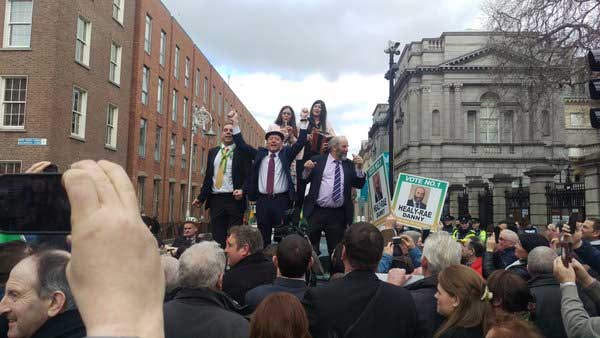Family values? Oh, yes, the dynastic principle of following in a family political tradition is thriving.
Among first-time TDs just elected are Aisling Dempsey in Meath, daughter of the former Fianna Fail minister Noel Dempsey; Marie Sherlock for Labour, niece of Labour Party TD Joe Sherlock and cousin to former TD Seán Sherlock; Grace Boland in Fingal West, daughter of late TD John Boland and niece of Fingal councillor Cathal Boland; Emer Currie, FG daughter of Austin Currie the co-founder of the North’s SDLP; Seamus McGrath, Cork FF, and younger brother of TD Michael McGrath; Shay Brennan in Dublin – son of FF minister Séamus Brennan.
Lineage
Politics being in the family is well-established in Ireland (and elsewhere too). Enda Kenny was the son of a Mayo TD Henry, and Seán Haughey also followed in his father’s footsteps; while Éamon Ó Cuív is the grandson of Éamon de Valera.
The Andrews clan have been politically ubiquitous, including David and Niall, son of the legendary Tod, Barry (son of David) and Chris (son of Niall), who incidentally just lost his Sinn Féin seat. And then there are the wondrous Healy-Raes siblings.
And isn’t Senator Alice Higgins the daughter of Michael D, a veteran politician even before he was raised to the presidency?
Those opposed to the dynastic principle may say it is “nepotistic” but I consider it useful, even laudable.
It’s especially helpful, when electing a new government, to have people around who have honed their political skills by learning from their family members. They will also have a sense of political history.
Dynasties can bring stability and continuity: it’s common for farmers to be the sons and daughters of farmers, and for doctors to come from medical families. In the performing arts, actors are not unusually the offspring of thespians (the Cusack family, the Redgraves). Even in the humble trade of journalism, one generation may follow another in the inky tradition. If my grandchildren go into the scribbling career, they will be the fourth generation in the family line to do so. (Although I beg of them to become scientists and engineers – where the money is!)
Ireland doesn’t really have a conservative party, but at least it has a conservative tradition of upholding family vocational trends!
Reflections on a political pioneer
I got to know Gemma Hussey – who has died, aged 86 – through her sister, Anne Moran, a clever and witty woman who was a Spanish language specialist. Gemma was perhaps the more ambitious of the two sisters, and achieved a lot as the first Fine Gael woman ever to be a cabinet minister (appointed by Garret FitzGerald.)
She was also the first Irish politician to have published a diary – “At the Cutting Edge” about her time in cabinet, (whilst those involved were still alive). It was forthright about the inner workings of government, but she was also criticised for her disclosures about the various breakdowns in cabinet unity and communication.
She charted her part in the 1986 divorce referendum candidly, critical of the inadequate tactics of the pro-divorce lobby – and rather patronisingly dismissing anti-divorce women as frightened and intimidated by the likes of Alice Glenn. A complication arose when, on one campaign occasion, Gemma was scheduled to give a speech for divorce, while her brother Paddy was to make a speech against it!
Gemma supported women’s rights and co-founded the Women’s Political Association, which some feminists regarded as the more affluent wing of the movement.
She chose to have a secular funeral at the RDS. Yet, not long ago, she told me how pleased she was that some of her grandchildren were receiving such a fine education at Gonzaga Jesuit school.
Catholic traditions providing consolation
I had a somewhat unpleasant (though mercifully swift) medical procedure last week called an endoscopy. That’s when they shove a small camera down your throat to see what’s going on in the upper digestive system.
The examination required a long period of fasting beforehand: no food from midnight the night before (the appointment was at 11 a.m.), and no liquids six hours in advance. In fact, I fasted from 9pm at night until 2pm the next day.
My mind went back to the days when Catholics routinely did a fast from midnight in preparation for holy Communion the next morning. Oftentimes, country Irish people would walk miles to Mass on an empty stomach.
I was very sorry for myself not being able to have even a morning cup of tea – but then I reflected how stoical people used to be. What discipline and self-control they exercised in adhering to such strict fasting rules.
And indeed, I discovered that once you get used to it, your body adjusts.
By the way, the result of the endoscopy was benign: I seem to have a hiatus hernia, which was deemed to be harmless. A Te Deum for that.


 Mary Kenny
Mary Kenny The Healy-Rae clan on campaign trail
The Healy-Rae clan on campaign trail 